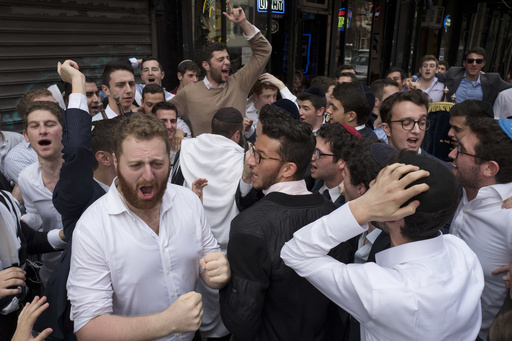
NEW YORK — Typically, Simchat Torah stands as one of the most celebratory days within the Jewish calendar, renowned for lively dancing around the Torah scroll. However, Jewish leaders are acknowledging that this week’s festivities will carry a weight of sadness, as they remember the tragic events of last year’s Simchat Torah, which coincided with the devastating attack on Israel on October 7, resulting in the deaths of approximately 1,200 people and the kidnapping of 250 others by Hamas.
Rabbi Rick Jacobs, president of the Union for Reform Judaism, expressed that the upcoming celebrations on Wednesday and Thursday will blend joy with sorrow and remembrance. “Should we dance again? Is sufficient time behind us?” he pondered. Representing over 800 Reform synagogues across North America, Jacobs concluded, “I believe we must dance. There’s a strong sense of defiance in celebrating with the Torah, refusing to give in to those who wish to harm us. Jewish life cannot be paused.”
Simchat Torah not only signals the end of the annual cycle of Torah readings but also marks the beginning of a new one. The central event, known as hakafot, involves participants joyfully marching and dancing with the Torah scrolls. The Chabad-Lubavitch organization describes this holiday as one filled with “unrestrained joy.” Rabbi Motti Seligson, a spokesperson for Chabad, noted, “There are moments for mourning and moments for joy, and this occasion is for celebration.” He emphasized that such celebrations honor those lost and affirm Jewish identity.
Rabbi Leo Dee, an educator from Efrat in the West Bank who personally faced tragedy with the loss of his wife and two daughters in an attack by Palestinian militants during Passover last April, also called for joy. In his reflections published by a London-based newspaper, he shared how rabbis around the globe are grappling with the essence of celebrating Simchat Torah amid grief. “It is a festival day when mourning is prohibited,” he noted, balancing this with the memory of a horrific attack. He proposed using this Simchat Torah to showcase support for Israel by encouraging immigration, emphasizing the strength and promise of its people.
In the United States, some Jewish community members shared their own feelings of melancholy intertwined with celebration. Chaim Botwinick, a Florida-based executive coach, remarked that the traditional singing and dancing would forever carry a shadow of sadness imprinted by the events following October 7, 2023. He eloquently stated, “While we may dance amidst tears, our hope must never wane.”
Rabbi Avi Killip, executive vice president of the Hadar Institute in New York, mirrored these sentiments, observing that joy from children during celebrations may contrast sharply with the sorrow expressed by older generations. “This year, it wouldn’t be inappropriate to highlight our sorrow over the joy of children,” Killip articulated. “Today, we allow our tears. Future years will welcome children who did not witness this pain, and I hope they will restore the unmitigated joy to our Simchat Torah celebrations.”
Rabbi Moshe Hauer of the Orthodox Union shared insights on how commemorations in Orthodox synagogues will remain “deeply Jewish and for us alone.” He articulated plans for the celebration to directly connect to the year’s events and challenges, highlighting the value of the Torah. “As we carry our children and Torah scrolls, we will celebrate with deep joy, perpetuating our mission to enact goodness, uphold values from the Torah, and shine light to the world,” he emphasized.
The upcoming Simchat Torah promises to be a multifaceted event, interweaving joy, reflection, and a robust tribute to resilience within the Jewish community.
